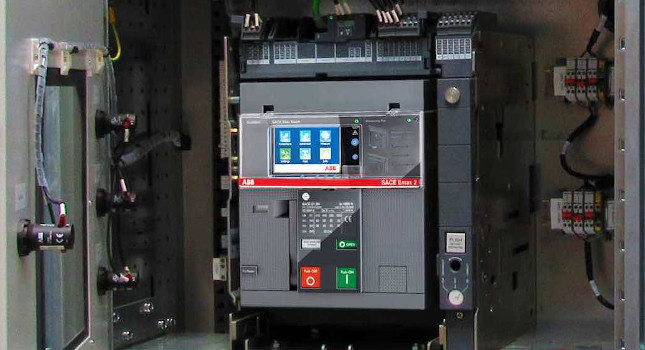An Air Circuit Breaker (ACB) is a type of circuit breaker that uses air as the arc extinguishing medium. It is mainly used for low-voltage applications to protect electrical circuits and equipment from overloads, short circuits, and faults by automatically interrupting the current flow when a problem occurs.

Understanding the Basics of Air Circuit Breakers
Introduction
An air circuit breaker (ACB) is an essential part of any electrical system. It protects your system against overloads and short circuits. Unlike a traditional circuit breaker, which uses oil or other mediums, ACBs rely on air as the medium for arc quenching. In this blog, we will go over everything you need to know about air circuit breakers (ACBs), from their components to why they matter. Let’s dive in.

What is an Air Circuit Breaker (ACB)?
An air circuit breaker (ACB) is a type of electrical protection device that stops the flow of current in an electrical circuit. It is intended to protect electrical equipment against damage caused by overcurrents, short circuits, or other electrical defects. ACBs are widely employed in industrial and commercial power systems, where they are vital to the safety and dependability of electrical facilities.
An air circuit breaker operates on the idea of arc extinguishing in air. When a fault develops, the breaker contacts separate, resulting in an electric arc. This arc is extinguished by the air surrounding the contacts, which serves as a medium for cooling and de-ionizing the arc, so terminating current flow.
Types of air circuit breakers
Here are the main types of Air Circuit Breakers (ACB):
Plain Break Type: Uses air at atmospheric pressure to extinguish the arc.
Magnetic Blowout Type: Uses magnetic fields to stretch and cool the arc.
Cross-Blast Type: Uses air jets directed at the arc for faster cooling.
Arc Chute Type: Divides the arc into small segments for quick extinction.
Components of an Air Circuit Breaker
The key components of air circuit breakers work together to provide effective current interruption and electrical system protection. ACBs rely on contacts, arc chutes, trip mechanisms, blowout coils, the insulating medium, operating mechanisms, and the frame and housing to function properly.
- Operating Mechanism: Opens/closes contacts manually, electrically, or via motor.
- Contacts: High-conductivity parts that make or break the circuit.
- Arc Chute: Extinguishes the arc formed during circuit interruption.
- Trip Unit: Detects faults (overcurrent, short circuit) and triggers disconnection.
- Control Panel/Handle: Enables manual or remote operation.
- Enclosure: Protects the ACB from dust, moisture, and accidental contact.
- Mechanical Interlocks: Prevent unsafe operation.
- Trip Indication: Shows if the breaker has tripped.
- Auxiliary Contacts: Send status signals to control systems.
- Opening/Closing Coils: Used in motorized ACBs for automatic operation.
Applications of Air Circuit Breakers
Air circuit breakers have several uses and applications in various fields. It includes,
Industrial Use Cases
Air circuit breakers (ACBs) are essential in industrial environments like manufacturing plants, power stations, and data centers.
Commercial Use Cases
In commercial settings such as office buildings, malls, and hospitals, ACBs manage complex electrical loads safely and efficiently.
Residential Use Cases
For homes and smart residences, ACBs safeguard electrical panels from overloads and short circuits.
Why Air Circuit Breakers Matter
Air circuit breakers (ACBs) play a crucial role in modern electrical systems, offering several key benefits that make them a preferred choice for industrial and commercial applications:
- Handles High Fault Currents: Ideal for industrial and commercial use.
- Reliable Protection: Performs well even in harsh conditions.
- Adjustable Settings: Customizable for different applications.
- Fast Operation: Minimizes damage and downtime.
- Easy Maintenance: The draw-out design simplifies servicing.
- Long Lifespan: Durable with low maintenance needs.
- Enhanced Safety: Includes arc protection and interlocks.
- Wide Compatibility: Works with various electrical systems.
Air circuit breakers working principle
The working principle of an Air Circuit Breaker (ACB) is based on using compressed air to extinguish the electric arc when a fault occurs.
When a fault or overload is detected:
The breaker contacts separate, creating an arc between them.
The arc is cooled and stretched by air (natural or forced) inside the arc chamber.
The air quickly cools and de-ionizes the arc path, stopping the current flow and protecting the circuit.
Conclusion
An Air circuit breaker diagram is considered an important element for your electrical system in assuring the safety, reliability, and efficiency of electrical systems in a variety of applications and sectors. ACBs are critical components in industrial plants, commercial buildings, data centres, power generation facilities, renewable energy installations, marine and offshore environments, railway systems, mining operations, healthcare facilities, and residential settings due to their high breaking capacity, dependability, flexibility, and ease of maintenance.
If you’re looking to buy a reliable air circuit breaker, our partnership with ABB, a trusted leader in electromechanical solutions. Contact us today, and we will help you find the best solution for your needs.
FAQs
+
-
How is an air circuit breaker different from other types?
ACBs use air to extinguish arcs, making them safer and easier to maintain than oil or vacuum breakers, especially in low-voltage systems.
+
-
Where are air circuit breakers commonly used?
They’re ideal for industrial plants, commercial buildings, and data centers that require high fault protection and reliable operation.
+
-
What are air circuit breakers?
+
-
What is the function of the ACB?
The function of an Air Circuit Breaker (ACB) is to protect electrical circuits and equipment from overloads, short circuits, and other faults. It automatically interrupts the flow of current when abnormal conditions occur, ensuring safety and preventing damage to the electrical system.
+
-
What is the difference between MCCB and ACB?
MCCB is used for low-voltage and smaller loads, while ACB handles higher currents and protects main electrical systems.
+
-
What is the difference between SF6 and air circuit breaker?
SF6 circuit breakers use sulfur hexafluoride gas for insulation and arc quenching, offering better performance and compact size.
Air circuit breakers, on the other hand, use air for arc extinction and are typically larger and used for lower voltage applications.


 العربية
العربية

